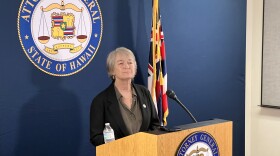In response to recent federal firings and cuts by Elon Musk's Department of Government Efficiency under the Trump administration, the state has launched Operation Hire Hawaiʻi to fast-track impacted workers into local government positions.
Gov. Josh Green spoke to The Conversation on Thursday morning about this emergency situation, vaccine exemptions in schools, and the resignation of John Mizuno, who led the state's homelessness initiatives.
Interview Highlights
On Operation Hire Hawaiʻi, his workforce transition initiative
GOV. JOSH GREEN: We want people to come and work for Hawaiʻi, if they have separated and if they have a connection especially to Hawaiʻi. So we have a total, huge vacancy problem. The State of Hawaiʻi has 4,020 civil service vacancies and 1,005 executive branch vacancies. So we can hire a lot of people. We've already had 400-plus people inquire. And if people come to that hiring fair, we're going to fast-track them into positions if they have the right skillset. So we're here to be supportive and care for our people... This is obviously an emergency situation based on what the DOGE has done at the federal level. So I told our person, we want to be onboarding people in 14 days. We want to give them offers and bring them on.
On his kauhale initiative and John Mizuno's time leading homelessness programs
GREEN: Well, you know, Civil Beat continues to get stories wrong, unfortunately. They did not accept our description of what actually happened, which was John moved in a lateral leadership role after a wonderful 15 months of building kauhale, over now to a job and a role that's going to be creating reunions for people and the uniting families who have been homeless, and he's been passionate about that for a long time, so he goes in a lateral leadership role, and I think John had some positive things to say. And then Jun Yang, who worked for mayor and has been essentially a partner in the kauhale development program, 100%, steps into that role. The previous homeless director for us lasted about 12 months. It's a grueling job. John, 15 months. And we're kind of always keeping our bench warm and then bringing people in, because it's so much hard work to care for those who are houseless. But I will tell you that the demands that Civil Beat made, from an information standpoint, were really inappropriate on me, and it's unfortunate, because I try to have a really good relationship with everybody, but it's important to get those facts straight... I want to say this quite directly to those who are listening or who might read Civil Beat: Negativity doesn't help. Taking potshots doesn't help, and frankly, it's very hard work to help people who have no natural advocates, and I'm going to keep doing it. I'm going to keep fighting for people, and we will see very significant savings, and are, for this program when we don't have 30% of our emergency department rooms occupied by homeless individuals at $4,400 a pop.
(Hawaiʻi Public Radio reached out to Civil Beat for a comment on Green's criticism of the article about Mizuno leaving his post to take another position in the administration. Civil Beat stands by the story.)
On vaccine exemptions in schools
GREEN: I know people saw me go to D.C. to fight against RFK Jr.'s nomination. He is continuing to cast doubt on vaccination programs. He said that it was OK, basically, to spread the measles, and now you're seeing people die, and that's going to happen all across the country as vaccination rates drop below the threshold for herd immunity. We have to fight hard to keep herd immunity here, and so the bills going through right now, through the Legislature, to discuss religious exemptions, I think that there has to be and can be a good compromise reached. But we also have to really encourage people to follow the public health science, and that is that vaccinations are safe and that they prevent these diseases. As we see it doubling, or if in the future, I'm sure it will continue to worsen, where people take extra exemptions, we have to acknowledge we're going to have disease outbreaks. And so a lot of people use those exemptions, unfortunately, just to get out of the requirement, especially for public schools. I have talked about compromises behind the scenes, and we're early in the legislative session, so I'm confident we'll have some kind of compromise if a bill passes. I don't want people to panic, if they have a deeply felt religious need to not do something that we ask, like get vaccinated, but it has to be genuine, and it also can't risk the public health of everyone around them. That's what's fundamental here.
On the Trump administration's federal funding freezes
GREEN: What the federal government does, I have only modest control over, if any. I am against freezing these dollars for our safety net programs. I am preparing to have somewhere between $200 million and $300 million of additional safety net dollars for Medicaid, if there are deep cuts in some way... I'm not the president of the United States and don't have the capacity to guide the federal policy and the nation's policies right now. That's what the election is about. What I can do is provide enough protection with our, you know, our dollars, and they're not infinite, to keep people from going into a spiral, basically an existential crisis. But I might be able to hold it off for two years. We'll see. And then people have to vote again for their congresspeople. So I'll tell you, all of our congresspeople are in favor of protecting the safety net, all those from Hawaiʻi.
Further reading:
This interview aired on The Conversation on Feb. 27, 2025. The Conversation airs weekdays at 11 a.m.









